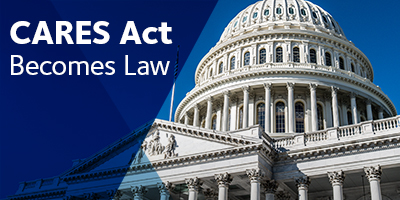Corona Virus Update-Helping Small Businesses
 On Friday, President Trump signed into law the Senate’s coronavirus emergency relief package, known as the Coronavirus Aid, Relief, and Economic Security Act (CARES Act). To better explain the CARES Act, and the relief it will provide, Senator Todd Young’s team created a comprehensive toolkit that outlines what assistance is available and answers many frequently asked questions. The first I want to share is how to help small businesses. Here is what he outlined from the CARES Act:
On Friday, President Trump signed into law the Senate’s coronavirus emergency relief package, known as the Coronavirus Aid, Relief, and Economic Security Act (CARES Act). To better explain the CARES Act, and the relief it will provide, Senator Todd Young’s team created a comprehensive toolkit that outlines what assistance is available and answers many frequently asked questions. The first I want to share is how to help small businesses. Here is what he outlined from the CARES Act:
Employee Retention Credit
- Provides a refundable payroll tax credit for 50 percent of wages paid by employers to workers from March 13, 2020, through December 31, 2020.
- The credit is made available to employers whose (1) operations were fully or partially suspended due to COVID-19, or (2) experienced a 50 percent loss in gross receipts in the current calendar quarter compared to the prior year.
- The credit is provided for the first $10,000 of compensation(including health benefits) per eligible
Payroll Tax Deferment
- Allows employers and self-employed individuals to defer the 6.2 percent employer-side Social Security payroll tax payments.
- The deferred payment must be paid over two years, with half due by December 31, 2021, and the other half by December 31, 2022.
Net Operating Losses (NOL)
- Allows NOLs earned in 2018, 2019, or 2020 to be carried back five years. NOLs are currently subject to income limitations and cannot be carried back to reduce taxable income in a prior year.
- Temporarily removes the taxable income limitation to allow businesses to use NOLs to fully offset their taxable income.
- These changes will allow businesses to receive critical cash flow from amended tax
Qualified Improvement Property (QIP)
- Enables businesses to use bonus depreciation for improvements to facilities instead of having to depreciate those improvements over 39 years.
- This is a technical correction to the Tax Cuts and Jobs Act and is therefore retroactive. The fix will incentivize businesses to continue investments as the country recovers from the COVID-19 crisis.
Economic Stabilization
- Provides $500 billion in emergency relief through the S. Treasury to provide loans, loan guarantees, and other investments to adversely impacted businesses, states, and localities.
- Includes direct lending of $25 billion for passenger airlines, $4 billion for cargo airlines, and $17 billion for business critical to maintaining U.S. national security.
- Establishes certain limitations for companies receiving assistance, including the prohibition of buying back stocks, outsourcing jobs, or substantially increasing executive salaries and severance pay.
Paycheck Protection Program
- Expands the existing 7(a) SBA loan program to provide $350 billion of payroll support through a new Paycheck Protection Program. Eligible employers include:
- Small employers with 500 employees or fewer, as well as those who meet the current SBA size standards.
- Self-employed and “gig economy” individuals.
- Certain nonprofits, including 501(c)(3) organizations, 501(c)(19) veteran organizations, and tribal businesses.
- Loans are provided through existing SBA-certified lenders, and additional lenders will be added through a streamlined process.
- Maximum allowable loans are equal to 250 percent of the applicant’s average monthly payroll, including salaries, paid leave, insurance premiums, and retirement contributions plus mortgage interest, rent, and utility payment Loans are capped at $10 million per small business.
- Conditional upon a business retaining their employees and payroll levels, portions of the loan used to cover payroll and specified expenses would be forgiven.
- Businesses who have already laid off or furloughed workers, are provided a 30 day grace period following the loan origination date to rehire employees.
Emergency Economic Injury Disaster Loans (EIDL)
- Establishes an Emergency Grant to allow eligible entities to request an advance payment of $10,000 on the EIDL loan within three days to support payroll and other debt obligations.
- Expands the eligibility for entities suffering from the COVID-19 pandemic to access EIDL loans.
- Provides SBA with more flexibility to disperse small dollar loans.
- EIDLs issued prior to enactment of the law may be eligible for forgiveness to provide parity with the modification to 7(a) loans.
Entrepreneurial Assistance
- Provides grants for SBA resource partners to offer counseling, training, and related assistance to small businesses affected by COVID-19:
- $240 million for Small Business Development Centers and Women’s Business Centers.
- $25 million to develop online information and training programs.
- $10 million for Minority Business Centers to integrate technical assistance for
Visit sba.gov for additional guidance on application processes

